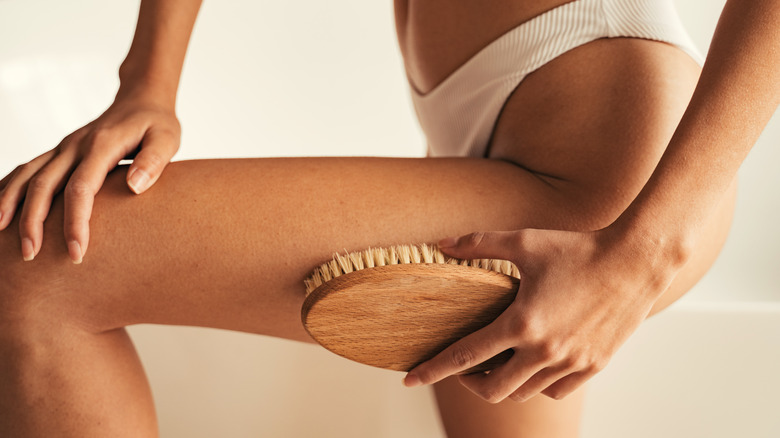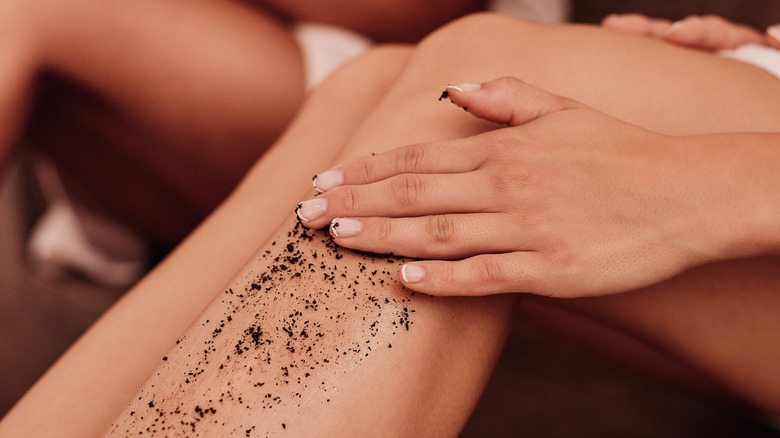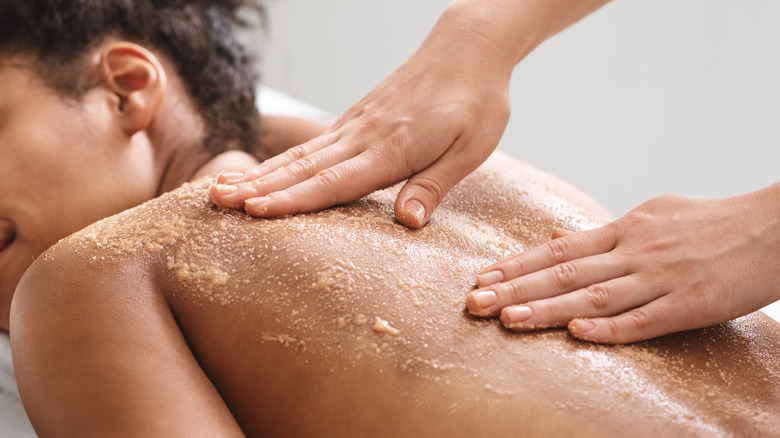The Ultimate Guide To Body Exfoliation (It's About More Than Using Salt Scrubs)
Scrub your heart out, they said. It will bring out your inner glow, they said. Exfoliation is an integral step in skincare that people have long touted as the key to a smoother complexion. When you exfoliate, dead skin cells lurking on the surface of your skin will fall off, resulting in unblocked pores, less hyperpigmentation, and an overall brighter appearance.
But apparently, we don't even need to do anything for our skin to renew. "Our skin cells naturally exfoliate on their own," Chicago-based dermatologist Caroline Robinson told The Washington Post, noting that the skin is designed to revitalize itself every 28 days or so. "Products and tools that help us exfoliate are designed to encourage a healthy behavior our skin does naturally." But even if our skin is already capable of shedding dead skin on its own, there's still a case to be made about accelerating the process ourselves, especially when it comes to the skin on the rest of our bodies. More often than not, we tend to forget the skin outside of our faces and necks, when we should be taking care of it just as much.
However, exfoliating the body isn't as simple as grabbing a loofah and rubbing it all over, nor does it begin and end with buying a body scrub and applying it across your chest, arms, and legs. There's a correct way to approach body exfoliation, and we're here to help break the process down.
Why do I need to exfoliate? And how often?
Our bodies can exfoliate themselves, sure, and doing the exfoliating yourself may seem like a superfluous measure, but it aids in reducing the congestion on your skin and uncovering your radiance. "Exfoliating the body will help to keep skin smooth and even, both to the eye and to touch. It will also help to encourage healthy cellular turnover so that the skin behaves more youthfully," Dr. Sophie Shotter, an aesthetic doctor, explained to Woman & Home.
As far as frequency goes, it hinges on what type of skin you have. "If you have very dry or sensitive skin, you might want to do it less frequently," Dr. Robert Anolik, clinical assistant professor of dermatology at the NYU Grossman School of Medicine, shared with Goop. "If you're not sensitive or you have oily skin, your skin can withstand — and should benefit from — a bit more." Exfoliating the body is not so different from exfoliating the face, really, in that, if your skin is typically resilient to outside elements, you'll benefit from doing it two or three times a week. But if your skin is dry and sensitive, or if you're prone to inflammation, doing it once is enough.
If you're only starting out, though, it's better to approach things with caution. You may want to begin with doing it only once a week, and then work your way up until you've built some kind of tolerance. The same goes for the products you use. It's better to start with gentle exfoliants first before you try out more potent options, like retinol.
A note on proper body exfoliation
Now when it comes to body exfoliation, one of the most important steps is choosing an exfoliant that works best for your body. As dermatologist Dr. Marisa Garshick previously told Women.com, you could either select a chemical or a physical exfoliant. "Physical exfoliants work by mechanically removing dead skin cells, while chemical exfoliants disrupt the bonds between dead skin cells to weaken them so they fall off," she explained. Physical exfoliants often get a bad rep because they are found to create micro-tears on the skin when used incorrectly, but they're the most accessible. "You can make up a natural exfoliant by using coconut oil mixed with used coffee grounds or granulated sugar," consultant dermatologist Rachael Burns told Byrdie. Meanwhile, chemical exfoliants often refer to products with alpha, beta, and polyhydroxy acids and enzymes, per Dr. Hadley King, a New York-based dermatologist. She shared with Well+Good that the ingredients in them "loosen the glue-like substance that holds the cells together, allowing them to ease away."
There's no concrete evidence that suggests that one type of exfoliant is better than the other, so it all boils down to how you use them. Rachael Burns suggests using a washcloth as it's gentler than a sponge, and when you're scrubbing, don't be too rough that you're hurting your skin, but avoid being too light, either. "Ensure that you apply pressure when exfoliating, and can feel the rough texture on your skin, to remove the surface layer of dead skin," she advised. As for chemical exfoliants? It's better to follow the instructions of the product and apply it using your hands, ideally in soft, circular motions.
How do I know if I've gone overboard?
Aggressive use of exfoliants can make your skin feel too raw, which may result in your skin barrier getting compromised. And you don't want that to happen, because your skin barrier functions as your skin's defender against outside elements. "In the simplest terms, it's the skin's protective layer," Dr. Mona Gohara, associate clinical professor of dermatology at the Yale School of Medicine, explained to Self. "Our skin is what protects our body, and the skin barrier is what protects the skin."
You would know that your skin barrier has been jeopardized if your skin exhibits redness outside your normal range, and if you experience excessive dryness, itchiness, and flaking. If your skin is more inflamed than usual and if it's extra reactive to even the gentlest of ingredients, that's a tell-tale sign, too.
How do you prevent this from happening, you ask? Well, for starters, you need to embrace the "less is more" philosophy, according to board-certified dermatologist Dr. Ife Rodney. "You want to exfoliate just enough to increase cell turnover and reveal fresh new skin, but be sure to not scratch or damage your skin by overusing these devices or products," she told Mindbodygreen. And while it may seem like a no-brainer, don't neglect to moisturize after exfoliating, too. Some people forget this crucial step, but it's the key to ensuring that your skin barrier remains intact. "This step is particularly important since body scrubs and exfoliators temporarily strip off your skin barrier, which can dry out your skin," Dr. Peter Young, medical director at Nurx Dermatology, shared with CNN. Trust us, your body will thank you.



